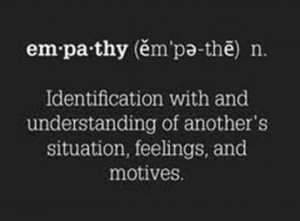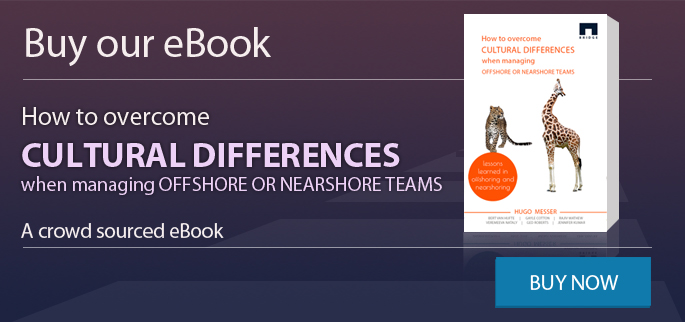What is the role of empathy in an offshoring context?Wat voor rol speelt empathie in een offshoring context?Vad spelar empati för roll i ett offshoringsammanhang?Was ist die Rolle von Empathie in einem Offshoring-Kontext?
Last week, I gave a presentation at the Technical University in Delft and one of my topics was ’empathy’. I always get some questioning faces when I present a slide with a definition of empathy on it. Normally, technologists get taught about rationality and data, not about people and emphatic relationships.
The definition of empathy that I used: Identification with and understanding of another’s situation, feelings, and motives.
 In my vision, empathy can help offshoring cooperations on several levels. The first level is in bridging the cultural differences, the second level is on the work itself (people, company and project).
In my vision, empathy can help offshoring cooperations on several levels. The first level is in bridging the cultural differences, the second level is on the work itself (people, company and project).
First level: Empathy for bridging cultural differences
* By empathizing, we can accept the differences. I believe the starting point to cooperate across cultures is that people acknowledge that the differences are there. People should not try to force their own value systems upon the people from the other culture. But they should try to understand what values the other people have and why and how they behave differently.
* From there we can organize around the differences: collaboration. Once we acknowledge that the differences ARE, we can find ways to manage around the differences. If for example, we acknowledge that in India, people say ‘no’ in a different way.Watch this video! We can use a different type of questioning to find out if they agree or not. Or we could spend some months in India to find out how this Indian yes-no works.
* If we do not accept the differences, cooperating can lead to frustration. I have seen in many cases that if a person holds on to his own world view and his own values, it can lead to frustration because one gets frustrated that the other person doesn’t share his views. And this frustration can also lead to project failure.
Second level: Empathy in the works or projects
In the work itself, it helps to stimulate empathizing:
* Among team members: invest in trips. It helps if the onshore and nearshore team members meet eachother (regularly). People bond when they drink a beer or eat a chapatti together. This bonding promotes understanding and helps the team to produce better results.
* With the company culture: mission, vision, values. The offshore team doesn’t drink coffee with you in the morning; they don’t speak to the CEO who expresses his vision day in and day out. In the ideal case, the offshore people consider themselves colleagues and an essential part of the company. In order to realize this, they need to identify with the value system, the reason the company exists and the direction it is heading.
* With the products: Who uses them? Why? How do we earn money? Often, the onshore team has a deep knowledge about a software product. They have built it, they discuss it every day and the product is ‘alove’ they also live in the country where the product is used by people. For the offshore or nearshore team this is different. Transfer of domain and product knowledge is important, especially in the beginning stages. People offshore need to identify, empathize with the products and get a deep understanding.
Related articles
Indians can’t say no, fact or fiction?
How software developers can overcome Cross-Cultural Communication mistakes in IT offshoring?
What tools do you use for managing global teams?
–This article is publishing under the series “Bridge the communication gap of virtual teams” by Bridge Global IT Staffing. Stay tuned for more article from this series…





When call-center offshoring to India was relatively new, I was asked to solve some communications issues between our domestic site (US) and that of a sub-contractor in Delhi. Both sites were working the same portfolio.
I looked at some multi-center, US domestic projects for inspiration.
I discovered that, when you have two sites (both in the US) efficiently working the same portfolio, at least 90% of communication will occur- not at the senior or executive level- but at the supervisory level. In other words, the first-level supervisors are the ones who “level-set” and synchronize the two sites, and they do this with frequent telephone calls, back of which are distinctly personal relationships.
(This is not to say that such communication always occurs between two domestic sites that share a portfolio. The essential flow of information can be blocked by senior management, and the results are uniformly bad.)
The goal was clear. We needed a level of friendship in both sites wherein, come Monday morning, Sanjay would call Ed just to ask him how his weekend had been. So we removed bottlenecks and
encouraged our supervisors, on both sides of the ocean, to conduct a bit of social business along with “business business.” But the most effective tool we employed were the video conferences.
There is something almost magical about face to face contact- even if it’s just on a video screen. Both teams of supervisors realized that their counterparts were different from themselves in only the most minor and unimportant ways. The effect was immediate. They carried the smiles they had shared on the video screen to their telephones in what became daily conversations, just as we had hoped.
No, this wasn’t empathy (strictly speaking) that had just been created between the two sites- it was friendship and understanding- but it was a great start. And it wasn’t long before true empathy and an effective relationship established itself.
Empathy plays a critical role, unfortunatelly, if is very difficult to find a metric, to define if your empathy level is enough or satisfy the expectations of the environment, personal perceptions gets in the way and I feel it is paramount to have an objective measure on the cultural context, as a landscape, in which you benchmark your empathy and more importantly, your cultural awareness.
May I suggest a tool that provides a granular report on cultural awareness, the cultural navigator. I have personally used it and facilitates self-awareness as well as helps you to benchmark your dimensions with other countries/people.
I read your question and the fine article below and I could not agree with you more. Empathy is, in my opinion, one of the MUST qualities that offshore teams and teams collaborating with these offshore teams should have. I laugh when you refer to Indian because I was in past experience faced to Indian offshore team, and also with Asian teams, whose culture is very different from the French company I used to work for. In order to improve our collaboration, we took a lot of time to ask question and discuss in order to ensure that we have understand their point of view and they have understand ours. It was I believe the most important phase in order to ensure that the reporting which was following would be correctly done.
I believe that empathy has a lot to bring to teams and managers in order to ensure the best working methods and productivity. How can someone work correctly if he does not understand the values, vision and aim of what he is doing? How can a manager manage his teams if he does not understand what each team member thinks and believe; how he can perform the adequate changes towards improvements if he has no understanding of the gaps. In offshore corporation cultural gaps can really deteriorate the productivity and even more the profitability, and like all new business if you do not realize, discover and understand the differences of the organization how can the best work come out from it.
I do not know if I have answered to your question, but would be interested to know if you are searching something further.